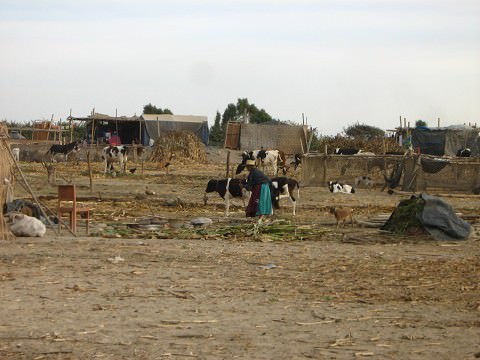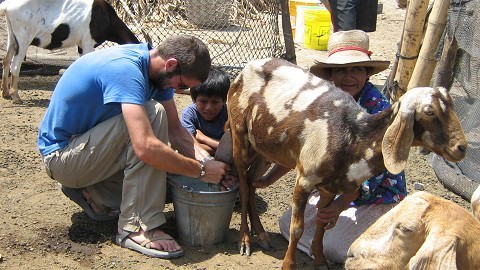“For I was hungry and you gave me something to eat, I was thirsty and
you gave me something to drink, I was a stranger and you invited me in.” –
Matthew 25.35
This past weekend Kim, Matt, Angie, Gretchen, and myself
were blessed with the opportunity to live with the people of Canchamana for a
few days. Initially I was rather
hesitant and didn’t want to do it because I knew that I would be
uncomfortable. We truly had no idea what
we were supposed to expect because we had heard a whole slew of things about
who these people are. All we knew was
that Canchamana was a farming community that didn’t have any real assistance
after the earthquake, so when we pulled up on Thursday morning our nonverbal
expectations were shattered.
We were overwhelmed with love – a love I’m learning more
about.
Prior to the earthquake back in August, the people of
Canchamana lived right off the coast of the Pacific ocean – literally. Surrounded by fields and natural springs for
their animals, plus an amazing view for the sunset over the ocean – these
people had it made. Heck, I would have
even enjoyed farming with them. But
after the nightmare in August, life hasn’t been the same.
The land they were once on is closed off to them so now
they’re living on rented property next to a giant heap of trash. Living so close to this illegal dumping zone
causes the 5-6 families in Canchamana to have a lot of health problems. There’s nowhere for their cattle to graze up
there, there’s no water for said cattle to drink, and it takes several hours
out of the day to take the animals out to graze – time they didn’t need
before. Water is few and far between for
the people; it comes when it comes. With
no transportation, they now sell their milk for half-price. Their only source of income is really no
income at all. And no one wants to claim
them. Tambo de Mora says that the people
of Canchamana are no longer their responsibility and the town of Sunape echoes
the same sentiment.
These people have no identity with this world.
And so we walked into this not knowing what we could really
do for them. We felt the Lord calling us
to merely “be with them. You can’t fix anything for these people, just
be with them and show them My love.”
But what good would that do? How
can we show them who Jesus is for them, how real the Kingdom really is to them
if we can’t meet any of their tangible needs?
The only thing I could really do was scoff at God.
When I walked into Canchamana, I walked in with my chest
puffed out in a lot of ways. I thought
that we would be able to play the role of a superhero, coming in and breathing
new life into this place, life that resonates with prosperity, that might give
these people some hope that they could live a decent life. I had no idea that they already had living
down to a better art than I did. And
they shoved this ‘living’ in my face in the most unexpected way.
It came through hospitality.
And I’m not quite sure how I’m supposed to explain
everything because I’m finding myself at a loss for words in what happened this
weekend. When we arrived, I think it was
safe to say that all of us didn’t think we would be working with a group of
believers, for people who were parched for God’s Word. They have had missionaries come in before,
but they have never stayed. Typically
they’ll drop in for a few hours, hand out some clothes and Bibles, never to be
seen again.
Yet we stayed (superheroes: check).
 Their welcome was overwhelming. As soon as we began pitching our tents, they
Their welcome was overwhelming. As soon as we began pitching our tents, they
started building us a shade shelter.
Then not knowing what all we brought, they started asking us how we were
going to eat, something that we decided to trust God on in faith. They made us meals every day, for every meal,
and brought them out to us. And the
biggest grace was in the fact that they willingly invited us into their lives
for three days. The people of Canchamana
were ecstatic that we wanted to stay with them – the first group to do so and
because of that, they knew that we really wanted to understand them and their
way of life.
And so we had a great three days living with them and
learning more about the “Canchamanaians” while building relationships in the
evening. It wasn’t until the last night
that we shared with them through worship what was on our hearts and especially
how they had rocked our lives for those three days. Again, I didn’t think we all fully realized
that we were working with a group of believers.
One of the ladies had told us prior that she reads her Bible when she
takes the cattle out grazing, but she’s not sure how she’s supposed to read it,
they’re not sure how they’re really supposed to pray, etc. They questioned us as to why we didn’t
worship with them the first night we got there.
Then I questioned our intentions in even coming. What did
we expect from ourselves for these people? My thoughts of being that overly
zealous superhero for three days were dashed.
I’ve been learning that the Kingdom of God isn’t about
something we make of ourselves on the outside.
The Kingdom is within our hearts and I’ve come to realize that it’s
poured out through displays of love. And
maybe when it comes to loving people we’re not even supposed to do anything
tangible for them outside of just ‘being’ with them. Obviously God was right: we weren’t going to
be a crew to come in and suck these people into our idea of what is real, what
living is really like.
Instead they pulled me into the Kingdom.
Love, in a lot of ways, is the greatest expression of the
Kingdom ‘here and now’. The people in
Canchamana may not have money, may not have land, may not have awesome homes, but
they have one of the greatest things in the world: love. And I’m so thankful
that they were able to strip me of some of my nonsensical ideas of Kingdom
living and place in me this seed of Kingdom love that I didn’t realize I was so
hungry to understand.
May the Lord bless these people that know how to live.
**Thanks to Angie for these pics. I stole them from you!**








